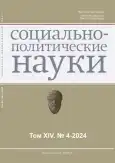Цифровая компетентность студенческой молодежи как фактор формирования общественно-политических установок
- Авторы: Гребняк О.В.1, Новоженина О.П.1
-
Учреждения:
- Институт социально-политических исследований Федерального научно-исследовательского социологического центра Российской академии наук (ИСПИ ФНИСЦ РАН)
- Выпуск: Том 14, № 4 (2024)
- Страницы: 67-77
- Раздел: Материалы симпозиума
- URL: https://journals.eco-vector.com/2223-0092/article/view/650782
- DOI: https://doi.org/10.33693/2223-0092-2024-14-4-67-77
- EDN: https://elibrary.ru/ORIAVV
- ID: 650782
Цитировать
Полный текст
Аннотация
В представленной статье авторы рассматривают политико-мировоззренческие интенции студенческой молодежи, связанные с активизацией сетевой среды, для прогноза социально-политической устойчивости гражданского общества и оценки возможных рисков. Процесс политической социализации молодежи последние годы претерпел серьезные трансформации: с появлением новых технологий изменились формы политической активности и взаимодействия, геополитическая ситуация вызвала активизацию общественно-политических, патриотических движений. Это повлекло за собой постепенный переход даже ранних этапов политической социализации из семейной среды в общественно-сетевую. Изменения затронули и тесно связанные с политической социализацией процессы становления гражданской культуры. От того, как это отразилось на специфике политического мировоззрения студенческой молодежи, глубоко погруженной в сетевую среду, зависит картина будущего российского общества. На основе данных всероссийского социологического исследования была проведена оценка зависимости вектора общественно-политических установок студенческой молодежи от уровня ее цифровой компетенции и сетевой активности. Как показал проведенный анализ, студенческая молодежь с повышенной сетевой активностью и развитыми цифровыми компетенциями обладает и большим потенциалом недовольства по сравнению с группой менее дигитализированных студентов. Учитывая востребованность трудовых кадров, обладающих навыками работы в цифровой среде, возникает необходимость принятия мер по снижению возможных рисков и канализации в позитивные формы проявления, так как нынешнее позиционирование студенческой молодежи может способствовать росту напряженности в обществе.
Полный текст
Об авторах
Оксана Валерьевна Гребняк
Институт социально-политических исследований Федерального научно-исследовательского социологического центра Российской академии наук (ИСПИ ФНИСЦ РАН)
Автор, ответственный за переписку.
Email: oksananov@yandex.ru
ORCID iD: 0000-0002-4565-7095
SPIN-код: 6256-1918
научный сотрудник
Россия, г. МоскваОльга Петровна Новоженина
Институт социально-политических исследований Федерального научно-исследовательского социологического центра Российской академии наук (ИСПИ ФНИСЦ РАН)
Email: olganov@yandex.ru
ORCID iD: 0000-0003-3511-0384
SPIN-код: 7343-9887
старший научный сотрудник
Россия, г. МоскваСписок литературы
- Анищенко А.В. Феномен цифрового политического участия: формы, модели и сущностные аспекты // Наука. Культура. Общество. 2023. Т. 29. № 4. С. 18–27. doi: 10.19181/nko.2023.29.4.2. EDN: ARPQCF.
- Володенков С.В., Федорченко С.Н. Цифровизация пространства современной политики в условиях глобальных технологических трансформаций: актуальные научные подходы, модели и сценарии // Вестник Московского университета. Серия 12: Политические науки. 2022. № 2. С. 46–57. EDN: GXRFWY.
- Гарин И.Ю., Лескова И.В. Политическое участие молодежи: дискурс социализации и формирование гражданственности // Политконсультант. 2023. Т. 3. № 1. EDN: XKIGAW. URL: https://politicjournal.ru/PDF/02PK123.pdf
- Иванова Г.П., Логвинова О.К. Внеучебная деятельность современного вуза в контексте социально-педагогического подхода // Вестник Нижневартовского государственного университета. 2017. № 3. С. 21–25. EDN: ZHDMOD.
- Левашов В.К., Гребняк О.В. Актуальные изменения социальных сетей и цифровой среды в период специальной военной операции на Украине // Социальные и гуманитарные знания. 2022. Т. 8. № 2 (30). С. 204–213. doi: 10.18255/2412-6519-2022-2-204-213. EDN: KHJIBR.
- Левашов В.К., Гребняк О.В. Россияне о вызовах искусственного интеллекта, нейронных сетей и социальном оптимизме // Социологические исследования. 2023. № 11. С. 115–120. doi: 10.31857/S013216250028537-3. EDN: KJRUCP.
- Левашов В.К., Гребняк О.В. Цифровизация в повседневной и общественно-политической жизни российских граждан // Социальная политика и социология. 2021. Т. 20. № 3 (140). С. 99–108. doi: 10.17922/2071-3665-2021-20-3-99-108. EDN: FBZPAH.
- Проказина Н.В. Коммуникативные практики молодежи в реальном и виртуальном пространствах // Наука. Культура. Общество. 2023. Т. 29. № 3. С. 69–81. doi: 10.19181/nko.2023.29.3.3. EDN: IWREJO.
- Сенатор С.Ю., Сокольникова Э.И., Емельянова М.В. Анализ современных подходов к реализации патриотического воспитания как составляющей высшего образования // Педагогика и психология образования. 2023. № 4. С. 123–136. doi: 10.31862/2500-297X-2023-4-123-136. EDN: KOXFKB.
- Тельных Е.О., Шеховцова Е.А. Патриотическое воспитание vs несистемная оппозиция // Человеческий капитал. 2024. № 3 (183). С. 233–246. doi: 10.25629/HC.2024.03.22. EDN: EFSNYA.
- Шевченко Л.В. Развитие гражданской субъектности в условиях информационного общества // Вестник Южно-Российского государственного технического университета (НПИ). Серия: Социально-экономические науки. 2023. Т. 16. № 1. С. 274–282. doi: 10.17213/2075-2067-2023-1-274-282. EDN: FTAVAG.
- George J.J., Leidner D.E. From clicktivism to hacktivism: Understanding digital activism // Information and Organization. 2019. Vol. 29. Art. 100249. doi: 10.13140/RG.2.2.16347.82726.
- Valenzuela S. Unpacking the use of social media for protest behavior: The roles of information, opinion expression, and activism // American Behavioral Scientist. 2013. Vol. 57. Issue 7. Pp. 920–942. doi: 10.1177/0002764213479375.
Дополнительные файлы













